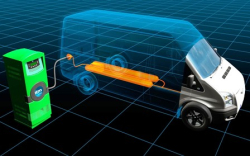Emission-free hydrogen-powered vans may be a reality on UK roads sooner than you think, thanks to a new partnership between two of the leading players in the drive to bring hydrogen to the automotive world.
 ITM Power and Roush Technologies have formed a partnership to trial hydrogen-powered commercial vehicles in the UK. Roush Technologies are an automotive engineering company with considerable experience of the commercial vehicle sector. Roush will be responsible for modifying existing vehicles to run on hydrogen and for researching new types of hydrogen power units.
ITM Power and Roush Technologies have formed a partnership to trial hydrogen-powered commercial vehicles in the UK. Roush Technologies are an automotive engineering company with considerable experience of the commercial vehicle sector. Roush will be responsible for modifying existing vehicles to run on hydrogen and for researching new types of hydrogen power units.
Meanwhile, ITM Power will provide the essential and hitherto missing link – a viable hydrogen refuelling solution. Over the last year, ITM have perfected a standalone hydrogen generation facility that will allow vehicle operators to generate their own hydrogen, on site.
ITM and Roush hope that their integrated, comprehensive solution will convince commercial operators that hydrogen is feasible and attractive as a commercial vehicle fuel – ITM CEO Jim Heathcote says that the two companies “are committed to bringing practical hydrogen power into the automotive market place within a dramatically reduced timeframe.”
ITM’s electrolyser has been patented and is due to enter production at their Sheffield facility later in 2008. Once it’s installed, all that the electolyser requires to generate hydrogen fuel is electricity and water – both readily available through an established distribution network! The obvious question, given what we already know about hydrogen fuel is just how much electricty and water does it need?
The electrolysis process used to produce hydrogen vehicle fuel is noted for its high energy requirements – for ITM’s solution to be both financially and environmentally viable it will need to generate a smaller carbon footprint and have lower running costs than the equivalent diesel vehicles.
If successful, this technology has the potential to provide an easily-depoloyed, national network of hydrogen filling stations – so the dream of zero emissions (from vehicles, if not power stations) could yet be a reality.

